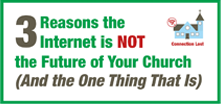
 Recently in a forum for church leaders, the question was posed:
Recently in a forum for church leaders, the question was posed:
How long should the church close if/when someone tests positive for COVID-19?
It’s a question that all organizations, including businesses and schools, are wrestling with as the nation attempts reopening and the numbers of cases continue to climb.
But what are the consequences of a closing plan?
Think about it.
Someone WILL test positive. It is almost guaranteed to happen.
Churches that take the position that they are going to close for a certain number of weeks if someone tests positive force themselves into a corner that will be very hard to back out of.
This virus is going to persist for a long time.
There will be random cases here and there even if there is a vaccine.
Are you going to close for two weeks every time someone tests positive?
If you take the position that any positive COVID diagnosis leads to a church closure, your church may not meet in person again for another 6 to 24 months.
Are you comfortable with that?
Let’s face it: a random positive every few weeks will devastate any church with that type of policy.
So let’s flip the script a bit.
What if the original question (“How long should the church close with a positive diagnosis?”) is the wrong question to ask?
What if the better question is “In the event of a positive COVID-19 diagnosis, how will we stay open?”
Instead of focusing on how to navigate a constant closing and reopening, this new question focuses on mitigating the spread even if a symptomatic person was in your building.
This shift, along with a solid plan, not only keeps the doors open, but also allows you to keep building your momentum as a church as you work toward your mission instead of staying stuck in a planning/cancelling/reconfiguring loop.
What might a solid plan for mitigating spread look like if you decide to make this shift?
Here are a few ideas to get you started.
Minimize large group and staff gatherings where possible and appropriate.
Each meeting or gathering should have a backup plan.
Could that meeting be summarized in an email instead? Or could the meeting leader touch base with each of the team by phone or text instead?
If a meeting of the minds is required, leave those logistical or informational meetings to the online realm. We know so many people are sick of zoom meetings, but if it helps keep our buildings open, keeps people safe, and furthers our mission, isn’t that worth it?
Make it a policy that if people continue meeting together in person in light of a positive diagnosis, it's because there's no way to do it virtually (think music rehearsals, facility improvements, building maintenance, etc).
Make the wearing of masks a requirement, not a request.
There are strong feelings on both sides of the mask debate, but sometimes as a leader you have to draw a line in the sand for the common good.
Make mark-wearing easy for those who don’t show up with their own by providing masks at the door.
Appropriately prepare your greeters and security team with language and procedures if a situation escalates at the door.
If your technology and staff/volunteer numbers allow, keep broadcasting your services online for those who are more at risk and those who are not medically able (or just refuse) to wear masks.
Shore up your cleaning policies and schedule if you haven’t already.
You may also want to have an emergency cleaning and communication crew on call if you get last-minute intel regarding an exposure in your building before services or an event.
Clear communication when there has been an exposure risk.
This strategy could look like an email or phone call to attenders of a specific event letting them know there was an exposure risk.
If the exposure risk was greater, a social media message may be appropriate.
Be sure to reiterate measures taken at the church building to keep folks safe when they return for that weekend's services, as well as steps they can and should take if they have additional concerns.
Also, be careful to use discernment here; you wouldn’t want to violate HIPAA laws by sharing that person’s name or other identifying information.
- - - - - - - - - - -
Please don’t misunderstand this shift from a closing plan to a stay-open plan.
Of course, COVID-19 is very serious and needs to be taken very seriously.
We also need to follow government guidelines for safe practices; none of these ideas are suggested if they fly in the face of your state or local government’s mandates.
As Christians, we have an even stronger civic responsibility to "walk the second mile" and always follow guidelines (yes, even if we don't personally agree with them) while at the same time searching for ways to live our lives, meet the relational needs of people, and keep moving forward as God’s church.
May God give you wisdom and discernment as you work to make the best decisions for your specific church and community.




